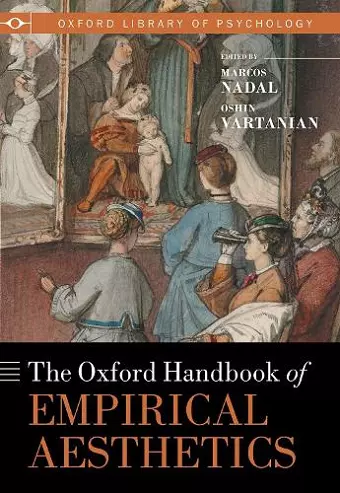The Oxford Handbook of Empirical Aesthetics
Oshin Vartanian author Marcos Nadal author
Format:Hardback
Publisher:Oxford University Press
Published:20th Oct '22
Should be back in stock very soon

Humans have engaged in artistic and aesthetic activities since the appearance of our species. Our ancestors have decorated their bodies, tools, and utensils for over 100,000 years. The expression of meaning using color, line, sound, rhythm, or movement, among other means, constitutes a fundamental aspect of our species' biological and cultural heritage. Art and aesthetics, therefore, contribute to our species identity and distinguish it from its living and extinct relatives. Science is faced with the challenge of explaining the natural foundations of such a unique trait, and the way cultural processes nurture it into magnificent expressions, historically and ethnically unique. How do the human mind and brain bring about these sorts of behaviors? What psychological and neural processes underlie the appreciation of painting, music, and dance? How does training modulate these processes? Are humans the only species capable of aesthetic appreciation, or are other species endowed with the rudiments of this capacity? Empirical examinations of such questions have a long and rich history in the discipline of psychology, the genesis of which can be traced back to the publication of Gustav Theodor Fechner's Vorschule der Aesthetik in 1876, making it the second oldest branch in experimental psychology. The Oxford Handbook of Empirical Aesthetics brings together leading experts in psychology, neuroimaging, art history, and philosophy to answer these questions. It provides the most comprehensive coverage of the domain of empirical aesthetics to date. With sections on visual art, dance, music, and many other art forms and aesthetic phenomena, the breadth of this volume's scope reflects the richness and variety of topics and methods currently used today by scientists to understand the way our mind and brain endow us with the faculty to produce and appreciate art and aesthetics.
A must-have for those interested in the psychology of aesthetics, the arts, and subjective experiences that in the past have defied empirical investigation. * Robert J. Sternberg, Professor of Psychology, Cornell University, USA *
How do we respond to and evaluate works of art? How is our response shaped by biology, culture, and/or personality? What methods are used to answer such questions empirically? For all researchers in the field of empirical aesthetics, and for readers outside the field interested in art and the mind, this handbook is an essential resource. * Ellen Winner, Professor Emerita of Psychology, Boston College, USA Senior Research Associate, Project Zero, Harvard Graduate School of Education, USA, Author of How Art Works: A Psychological Exploration (OUP, 2019) *
In 1871 Gustav Theodor Fechner conceived of an experimental aesthetics, studying art from below rather than above, using empirical not philosophical methods, studying what is liked rather than what should be liked. The Oxford Handbook of Empirical Aesthetics comprehensively summarises progress in realising Fechner's vision. * Chris McManus, Professor of Psychology, University College London, UK *
Filled to the brim with chapters on every imaginable aspect of the exciting and expanding field of empirical aesthetics. Overseen by masterful editors, this book is required reading for any scholar of the arts. * James C. Kaufman, Professor of Educational Psychology, University of Connecticut, USA *
ISBN: 9780198824350
Dimensions: 252mm x 178mm x 56mm
Weight: 2214g
1104 pages